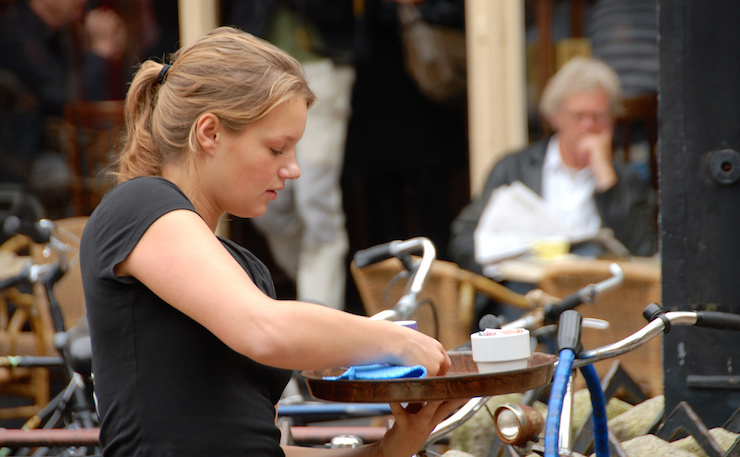The Coalition’s new direction on super is supposed to deliver more equity via flexibility. The real solution is something much more radical, writes Dr Petra Bueskens.
So, Scott’s talking super. Superannuation and the related pay gap mean Australian women on average retire with only one third of the super men have, and indeed almost half have no super at all.
“We don’t want women penalised for the choices they have made earlier in life,” Morrison says. “There has to be some flexibility in the system for people who may incur disruptions on their working life.”
In theory, these proposals sound good: granting women greater flexibility to make higher superannuation contributions, including while on maternity leave, without being taxed at the usual rate.
That would mean more equity, right? Wrong.
The majority of women don’t earn enough to be able to do so and their “disrupted” work histories – note the assumption that care is a “disruption” – mean their contributions, even if increased while on maternity leave, will not be comparable with men’s.
In this schema, no solution is being found for the intractable dilemma of combining care work with paid work (especially on the outdated patriarchal models of both work and family that prevail in this country).
In Australia most women reduce their working hours dramatically once they become mothers. Only a minority work full-time; the majority work part-time (including those who work very minimal hours in poorly paid jobs), while almost a quarter of mothers do not work at all.
Only a tiny minority of women work full-time across the life course, and only a very tiny minority of women work in highly paid jobs.
The pay gap is one issue here. Women working full-time earn 18 percent less than men and, over a lifetime, this makes a significant difference.
However, the deeper issue concerns the impossibility for mothers of strong participation in the workforce on its current terms, which presuppose primary attachment to paid work, long hours, and incompatible hours with caregiving (school pick-up and drop off, sick days, sports days, trips to the doctor, after school hobbies and play dates not to mention just being there). This is especially difficult for single mothers and is reflected in their lower labour force participation rates.
The suggestions Morrison is putting on the table fail to address this basic issue – that  work culture is incompatible with caregiving and thus the majority of women earn significantly less than men over their lifetime.
work culture is incompatible with caregiving and thus the majority of women earn significantly less than men over their lifetime.
As Morrison rightly points out, this is because of women’s – and it’s not just women, he is at pains to say, but of course it mostly is – disjointed work histories.
Women take “time out” to care for children and time out to care for aging and ailing relatives. Basically women are doing the caring, or what anthropologists more poetically call the “kin keeping”. This is the social and emotional glue that ties us all into relationships, families and communities.
Women do it and they do it for free. In fact they are punished for it. As the Australian Human Rights Commission states,
There is a large gap between the superannuation savings of Australian men and women. Because the current superannuation system is linked to paid work, it overwhelmingly disadvantages women who are more likely to move in and out of paid work to care for family members … Right now, many women are living their final years in poverty. If we don’t act, another generation of women will face similar prospects.
The problem is Morrison’s proposal assigns the cost of care to individual women. It doesn’t say society should pay the price – in practical terms, redistribute some of the wealth to women – for their caring work across the life-cycle, instead it is foregrounding women’s greater contributions to their own retirement. That is, it individualises (rather than socialises) the economic burden of care.
In effect, mothers are being offered the “flexibility” to pay for themselves to “make up” for “their choices” – that is reproducing the species, or, we could say, reproducing the nation and its income-earning, tax-paying citizens.
We see here the neoliberal promise of false autonomy. In fact social citizenship is possible when the state provides adequate support for those who cannot do so for themselves. In the curious case of mothers, they are doing fundamental work for society, bearing and rearing the next generation, and yet it is work that accrues no economic value, placing them – us! – in a precarious economic position, especially in older age.
In the neoliberal model women are free as individuals to work and earn as much as they want (or can), but as mothers they are constrained to a life of unremunerated care. Of course, they are now somehow expected to do both without adequate structural or social support.
Something in this contradictory picture doesn’t add up, which is evident when we look at women’s independent earnings and lifetime savings.
Although we are loathe to admit it, marriage currently operates as the only real safety net for women; that is, for the overwhelming majority who do not assume the male model of full-time, “uninterrupted” paid work over a lifetime.
The cost of care was, until recently, paid for by the family breadwinner (the husband) and his reward for this was having children who bore his name and a wife who undertook all the domestic work and kin-keeping.
Now we have apparently transitioned to a model of women’s economic self-sufficiency. Except that we have not. Women work fewer hours in lower paid jobs and almost a quarter in the key childrearing years of 25-44 do not work at all. Moreover, those in employment, even in top jobs, pay a “motherhood penalty”.
As Professor Michelle Budig said last week at a seminar at The University of Melbourne, the motherhood penalty is very strong in Australia and results from an intersection of ideology, policy and prejudice. Basically, once a woman has a child she is perceived as less competent, paid less than her similarly qualified male peers, and discriminated against when it comes to promotion and bonuses.
As Professor Treas also showed, although women try to resolve the contradictions between work and home individually, in fact they are systemic issues that can only be resolved at a systemic level.
Labor senator, Jenny McAllister responded to Scott Morrison by making the key point that we need a model which supports “women’s dual roles as carers and workers”.
In effect, mothers are being offered the “flexibility” to pay for themselves to “make up” for “their choices” – that is reproducing the species, or, we could say, reproducing the nation and its income-earning, tax-paying citizens.
How is this happening? Certainly not with the government’s superannuation proposals, which simply put the onus back onto women to work more. Certainly tax breaks on contributions to super offer some support, as do government contributions for low-income earners (something the Liberals are in fact abolishing), but the real support would come in the form of a profound reorganisation of paid work and the society wide recognition and remuneration of care work.
Instead of having to work more, and contribute more to super – I know, I’ve been doing this and it takes a huge chunk out of one’s salary – society should share the cost of caring for dependents. Instead of saying women have to “make up for their choices”, we should recognise that care work is a necessary social good and support it, not just with hallmark card rhetoric but with cold hard cash.
Sentimentality about motherhood doesn’t pay the rent or put food on the table and it doesn’t pay the electricity bill for an older single woman who has spent a lifetime caring for others and who now faces a society who cannot, or rather will not, care for her.
One innovative way of ameliorating the pervasive feminisation of poverty is the introduction of a universal basic income. This would redistribute wealth across the population and in particular to the poorest sectors of the community, which as is well known, is overwhelmingly made of women and their dependents.
As foremost scholar of basic income, Professor Carole Pateman argues the introduction of basic income both democratises citizenship and breaks down the “the mutual reinforcement of the institutions of marriage, employment, and citizenship”. Basic income is something politicians need to put onto the table if they truly want to ameliorate gender gaps in wealth and stop women accumulating poverty over their lifetimes.
Donate To New Matilda
New Matilda is a small, independent media outlet. We survive through reader contributions, and never losing a lawsuit. If you got something from this article, giving something back helps us to continue speaking truth to power. Every little bit counts.





